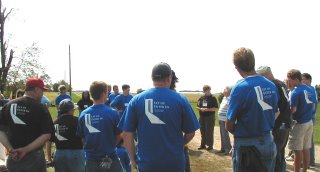Immanuel labor
by Andy Behrendt
 The 85-year-old woman didn't have a dollar figure for the damage that had been done to her Nicollet County farm. But for those of us who compared the state of her barn, storage sheds and trees to the way they looked in a photo taken three days before the tornado, the extent of the damage was clear enough.
The 85-year-old woman didn't have a dollar figure for the damage that had been done to her Nicollet County farm. But for those of us who compared the state of her barn, storage sheds and trees to the way they looked in a photo taken three days before the tornado, the extent of the damage was clear enough.About 50 of us — mostly new students, as well as returning students and faculty and staff members at Luther Seminary — made a little progress today in getting things back to normal for her. We continued what her family, friends and other volunteers have begun in the two weeks since the Aug. 24 tornado. As part of our arranged service day, we gathered debris from the remains of the sheds and from her soybean field, raked her lawn and cleared fallen branches. But there is still more work to be done.
Although I was a news reporter for four years, this was my first face-to-face encounter with the aftermath of a tornado. It was the same for many of my new friends, who were equally awed. It's amazing to consider what nature can do — not only ripping the roof from a barn and ravaging metal buildings, but also, as one of my friends noticed, stabbing a piece of stray wood into an especially sturdy tree.
It's amazing to think what can change in an instant. The woman told us that on that day, she had just learned from the TV that a tornado was passing nearby, and she had traveled only a few steps down the basement staircase when she heard her entire house jerking, along with the shattering of glass and the impact of large pieces of debris. Certainly, it was a blessing that she was alive and that her home itself was largely spared. (She also noted her delight that her garden was curiously intact and that her flowers continued to bloom.) And this was actually the second twister she survived — another struck this apparent tornado alley in 1998.
But it made me consider myself all the more blessed that nothing like this has ever happened to my home. In fact, nothing so devastating has ever crossed my path. It made this small bit of service feel like a privilege — the least I could do.
Meanwhile, as much as I'm nagged by fears about the difficulties I will face as a pastor, I consider myself lucky to be on this road and to attend Luther Seminary. For one, as we were reminded Tuesday, the cost of our learning is largely offset by donors who are investing in their future church leaders. But I also think about a friend from my summer Greek course who suddenly had to put seminary on hold after learning a couple weeks ago that his brother in Ethiopia has leukemia.
From my own selfish experience, I can say how easy it is to take the good things we have for granted. And with that, we often take God for granted. For many of us, when things are fine, it's easy to forget that we need God. It's only in the face of loss that many people finally seek him and consider his love for us. Diving into this line of work and study is finally helping me to get past that sort of selfishness. After all, God is there for us in the good times as well as the bad, and we need to be thankful.
At its best, that thankfulness prompts us to serve those in less fortunate circumstances — just as we served today in God's name. After the Le Sueur County Public Health Nursing Service had given tetanus shots to those of us who needed them, our cleanup crew worked not only at the woman's farm but also spent some time searching for debris in a nearby cornfield. (Strangely, the most common pieces of debris to cross my path were cans of Michelob Golden Light.) Meanwhile, other folks from the seminary worked at a Minneapolis shelter.
As an important footnote, today was a lot of fun. This week has been a lot of fun. It may change a bit once classes begin, but I couldn't be happier to be here with so many terrific new friends. I have a lot to thank God for. And with that, I'm so happy to serve.


0 Comments:
Post a Comment
<< Home